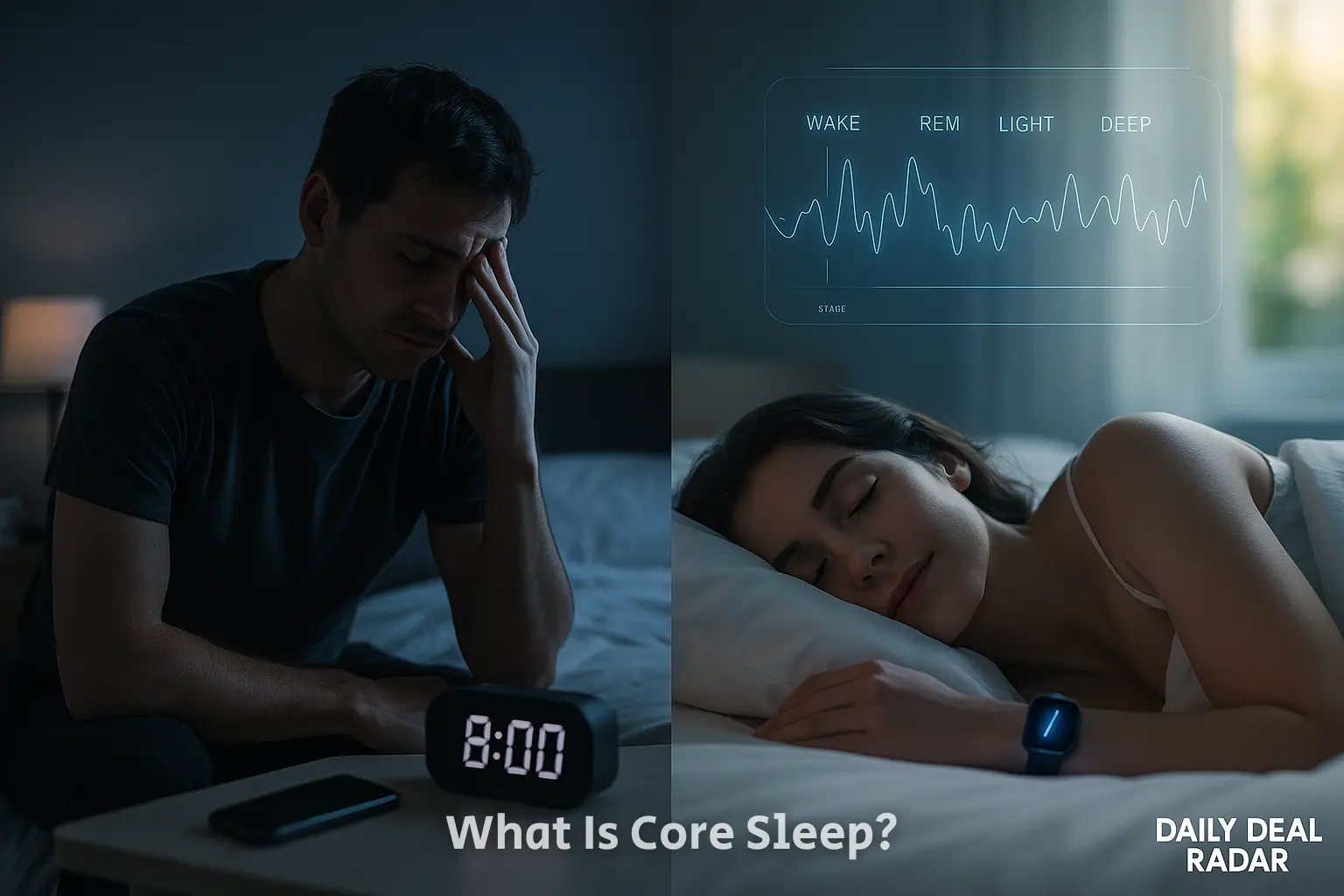Feeling Drained Even After 8 Hours? Daily Deal Radar Explains Why – And How to Fix It
We get it. At Daily Deal Radar, our team is constantly on the hunt for the best tech, tools, and insights to optimize your life. From snagging that must-have gadget at a steal to uncovering strategies for boosting productivity, we’re dedicated to helping you live smarter, not harder. And lately, a question has been echoing within our deal-hunting HQ: why do some nights of seemingly “enough” sleep leave us feeling refreshed, while others, even longer ones, leave us dragging? The answer, as we’ve delved deep into the research, lies in understanding what is core sleep.
You might be thinking, “Sleep is sleep, right?” Not exactly. Just like your phone battery cycles through different states, your sleep operates in distinct phases, each playing a crucial role in your physical and mental restoration. Understanding these phases, particularly the concept of core sleep, is the key to unlocking genuinely restorative rest. And because Daily Deal Radar is all about actionable solutions and value, we’ll not only break down the science but also point you towards potential tech deals that can help you optimize your sleep patterns.
Peeling Back the Layers: The Non-Negotiables of a Good Night’s Rest
Before we dive into the specifics of core sleep, let’s establish the fundamental architecture of a typical sleep cycle. When you drift off, your brain doesn’t simply power down. Instead, it cycles through two primary types of sleep:
-
- Non-Rapid Eye Movement (NREM) Sleep: This phase, which constitutes about 75-80% of your total sleep time, is further divided into three stages:
-
- Stage N1 (Light Sleep): This is the transitional phase between wakefulness and sleep. Your heartbeat and breathing slow, and brain waves begin to shift. You can be easily awakened during this stage.
-
- Stage N2 (Deeper Light Sleep): This is the dominant stage of sleep. Your heart rate and body temperature drop further, and brain wave activity becomes more rhythmic, with occasional bursts of rapid activity called sleep spindles. While still considered light sleep, it’s a bit harder to wake someone in this stage.
-
- Stage N3 (Deep Sleep or Slow-Wave Sleep – SWS): This is where the magic of physical restoration truly happens. Brain waves slow dramatically (hence “slow-wave sleep”), and your body repairs tissues, builds muscle and bone, and strengthens the immune system. It’s difficult to wake someone in deep sleep, and if you do, they’ll likely feel groggy (sleep inertia).
-
- Non-Rapid Eye Movement (NREM) Sleep: This phase, which constitutes about 75-80% of your total sleep time, is further divided into three stages:
-
- Rapid Eye Movement (REM) Sleep: As the name suggests, this stage is characterized by rapid and random eye movements, as well as increased brain activity that closely resembles wakefulness. This is when most vivid dreaming occurs. REM sleep is crucial for cognitive functions like learning, memory consolidation, and emotional processing. Your breathing becomes faster and irregular, and your heart rate and blood pressure increase. Interestingly, your voluntary muscles become temporarily paralyzed to prevent you from acting out your dreams.
A full sleep cycle, progressing through these NREM and REM stages, typically lasts around 90-120 minutes. Throughout a typical night of 7-9 hours, you’ll cycle through these stages 4-6 times.
The Heart of Restoration: Unpacking What is Core Sleep?
Now, let’s get to the core of the matter: what is core sleep? While not a formal, strictly scientific term with a universally agreed-upon definition in all sleep research, “core sleep” generally refers to the essential, most restorative stages of sleep that your body absolutely needs to function optimally.
From our research here at Daily Deal Radar, and aligning with the consensus among sleep experts, core sleep primarily encompasses Stage N3 (deep sleep or slow-wave sleep) and REM sleep. These are the stages where the most critical physical and cognitive restoration occurs.
-
- Why Stage N3 is Core: This is the period of intense physical repair and regeneration. Without sufficient deep sleep, you might experience:
-
- Impaired physical recovery from exercise or injury.
-
- Weakened immune function, making you more susceptible to illness.
-
- Difficulties with energy levels and overall physical performance.
-
- Potential disruptions in hormone regulation.
-
- Why Stage N3 is Core: This is the period of intense physical repair and regeneration. Without sufficient deep sleep, you might experience:
-
- Why REM Sleep is Core: This stage is vital for:
-
- Consolidating memories, transferring information from short-term to long-term storage.
-
- Processing emotions and regulating mood.
-
- Boosting creativity and problem-solving abilities.
-
- Maintaining healthy brain function.
-
- Why REM Sleep is Core: This stage is vital for:
Therefore, when we talk about getting “good quality” sleep, we’re really emphasizing the importance of achieving sufficient time in these core sleep stages. Even if you spend 8 hours in bed but don’t cycle adequately through deep sleep and REM, you’re likely to wake up feeling unrefreshed.
Why Core Sleep Matters to You: Aligning with Daily Deal Radar’s Values
At Daily Deal Radar, we’re not just about finding you the cheapest prices; we’re about empowering you to live your best life through smart choices. Understanding core sleep aligns perfectly with our core values:
-
- Smart & Data-Driven: We believe in making informed decisions based on evidence. The science behind sleep cycles and the critical roles of deep sleep and REM sleep is well-documented. Understanding this data allows you to optimize your sleep strategy intelligently.
-
- Consumer-First: Your well-being is paramount. By understanding core sleep, you can prioritize sleep quality over just quantity, leading to improved health, mood, and productivity – all benefiting you, the consumer.
-
- Honest & Authoritative: We aim to provide accurate and reliable information. Our research into core sleep is based on established sleep science, ensuring you receive trustworthy guidance.
-
- Value-Driven: We want you to get the most out of your time and resources. By focusing on core sleep, you can maximize the restorative benefits of your sleep, making every minute in bed more valuable.
We’re including this deep dive into core sleep because we know that peak performance – whether in your career, your hobbies, or your daily life – is intrinsically linked to quality rest. And just like we hunt for deals on tools that enhance your productivity, we want to equip you with the knowledge to optimize your body’s natural recovery processes.
The Culprits Stealing Your Core Sleep: Identifying Common Disruptors
Several factors can interfere with your ability to achieve sufficient core sleep:
-
- Inconsistent Sleep Schedules: Irregular bedtimes and wake-up times can disrupt your body’s natural circadian rhythm, making it harder to fall into and stay in the deeper stages of sleep.
-
- Poor Sleep Hygiene: This includes factors like consuming caffeine or alcohol close to bedtime, using electronic devices in bed (the blue light can suppress melatonin), an uncomfortable sleep environment (noise, light, temperature), and a lack of a relaxing bedtime routine.
-
- Stress and Anxiety: Racing thoughts and heightened arousal can make it difficult to fall asleep and can fragment your sleep cycles, reducing the amount of time spent in deep sleep and REM.
-
- Underlying Medical Conditions: Sleep disorders like sleep apnea, restless legs syndrome, and chronic pain can significantly disrupt sleep architecture and reduce core sleep.
-
- Diet and Exercise: While regular exercise is beneficial for sleep, intense workouts too close to bedtime can be stimulating. Similarly, heavy meals or sugary snacks before sleep can interfere with sleep quality.
-
- Age: As we age, the amount of time we spend in deep sleep tends to decrease.
Tech to the Rescue? Gadgets That Can Help You Understand and Optimize Core Sleep (Deal Radar Style!)
Now, for the part that aligns perfectly with Daily Deal Radar’s mission: leveraging technology to improve your life. While no gadget can magically give you more core sleep, several devices can help you understand your sleep patterns and identify areas for improvement. And, as always, our team is on the lookout for the best deals on these types of tech!
- Smartwatches and Fitness Trackers with Sleep Tracking: Devices from brands like Fitbit, Garmin, Apple, and Samsung (keep an eye on our pages for potential discounts!) often include sophisticated sleep tracking features. These can monitor your sleep stages, including light, deep, and REM sleep, providing you with data on the duration of each stage. This information can be invaluable in understanding if you’re getting enough core sleep. Daily Deal Radar Tip: Look for models that offer detailed sleep stage breakdowns and trend analysis over time.
Some of our recommendations with the lowest price sale just for you:
1. Garmin vívoactive 5 was $299.99 Now: 189.99!
2. Fitbit Inspire 3 was$100Now: $79 Only!
3. Apple Watch Series 10 was $399 Now: $329
4. Samsung Galaxy Watch 7 was $259 Now: $166
5. Polar Pacer Ultra-Light was $299 Now: $239
-
- Dedicated Sleep Trackers: Devices like the Oura Ring or bedside monitors (often utilizing sonar or similar technology) offer even more in-depth sleep analysis, often tracking metrics like heart rate variability, body temperature, and movement to provide a comprehensive picture of your sleep quality and stages. Daily Deal Radar Watch: We frequently see deals on these types of premium sleep trackers around major shopping events.
Some of our recommendations:
Oura Ring Gen 4 $350
- Dedicated Sleep Trackers: Devices like the Oura Ring or bedside monitors (often utilizing sonar or similar technology) offer even more in-depth sleep analysis, often tracking metrics like heart rate variability, body temperature, and movement to provide a comprehensive picture of your sleep quality and stages. Daily Deal Radar Watch: We frequently see deals on these types of premium sleep trackers around major shopping events.
-
- Smart Alarm Clocks: Instead of waking you abruptly, some smart alarm clocks use gentle light and sound to wake you during a lighter stage of sleep, potentially reducing sleep inertia. Some integrate with sleep trackers to optimize your wake-up time within a designated window. Daily Deal Radar Find: Keep an eye out for deals on sunrise alarm clocks and those with smart features.
-
- Smart Lighting: Lights that can be programmed to gradually dim in the evening and emit warmer tones (reducing blue light exposure) can help regulate your circadian rhythm and prepare your body for sleep. Conversely, brighter, cooler lights in the morning can signal your body to wake up. Daily Deal Radar Deal Alert: We often spot discounts on smart home lighting systems.
-
- White Noise Machines and Sound Conditioners: These devices can mask disruptive environmental noises, creating a more consistent and conducive sleep environment, potentially leading to less fragmented sleep and better progression through sleep stages. Daily Deal Radar Savings: Look for deals on sound machines, especially around home and wellness promotions.
Important Note from Daily Deal Radar: While these gadgets can provide valuable insights, they are not medical devices and should not be used to diagnose or treat sleep disorders. If you have significant concerns about your sleep, consult a healthcare professional.
Optimizing for Core Sleep: Actionable Steps Recommended by Daily Deal Radar
Understanding core sleep is the first step. Here’s how you can take action to optimize it, based on our research and recommendations:
-
- Prioritize Sleep Consistency: Go to bed and wake up around the same time every day, even on weekends, to regulate your body’s natural sleep-wake cycle.
- Create a Relaxing Bedtime Routine: Wind down for at least an hour before bed. This could include taking a warm bath, reading a physical book, listening to calming music, or practicing relaxation techniques like deep breathing or meditation.
- Optimize Your Sleep Environment: Ensure your bedroom is dark, quiet, and cool. Invest in comfortable bedding and consider blackout curtains or earplugs if needed.
- Be Mindful of Diet and Exercise: Avoid heavy meals, caffeine, and alcohol close to bedtime. While regular exercise is good, try to avoid intense workouts in the hours leading up to sleep.
- Limit Screen Time Before Bed: The blue light emitted from electronic devices can suppress melatonin production. Try to put away phones, tablets, and laptops at least an hour before sleep.
- Manage Stress and Anxiety: Practice stress-reducing techniques like mindfulness, yoga, or journaling. If stress is consistently impacting your sleep, consider seeking professional help.
- Consider a Sleep Tracker (with Realistic Expectations): Use the data from a sleep tracker to identify trends and potential disruptors, but don’t become overly fixated on the numbers. Focus on implementing healthy sleep habits.
- Listen to Your Body: Pay attention to how you feel throughout the day. Excessive daytime sleepiness can be a sign that you’re not getting enough quality sleep, even if you’re spending enough time in bed.
The Final Word from Daily Deal Radar: Sleep Smarter, Live Better
Understanding what is core sleep is a crucial step towards optimizing your overall well-being. By recognizing the vital roles of deep sleep and REM sleep, you can make informed choices to prioritize sleep quality over mere quantity. At Daily Deal Radar, we believe that by combining knowledge with the right tools (often available at fantastic deals!), you can unlock your full potential. So, take charge of your sleep, explore the tech that can help you gain insights, and remember that a well-rested you is a more productive, happier, and ultimately more successful you. Now, if you’ll excuse us, we’re off to find you the best deals on those sleep-enhancing gadgets!









2 Comments
Didn’t even know ‘core sleep’ was a thing. This explains a lot about why I feel dead in the afternoons 😂
So it’s not just about 8 hours? Mind blown.